May 16, 2025 | 10:03 GMT +7
May 16, 2025 | 10:03 GMT +7
Hotline: 0913.378.918
May 16, 2025 | 10:03 GMT +7
Hotline: 0913.378.918
Ben Tre, inherently famous for its lush coconut gardens, is gradually moving in a new direction, which is organic coconut growing. This model not only brings high-quality products that are safe for health but also contributes to protecting the environment and enhancing the brand value of Ben Tre coconut in the international market.
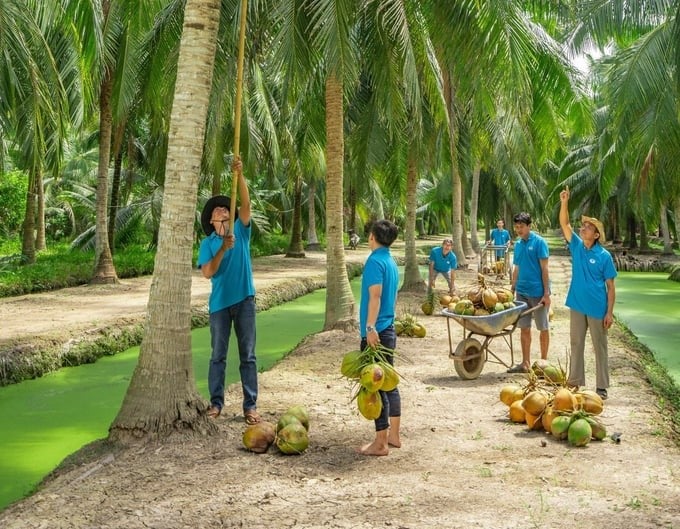
Ben Tre has over 19,200 ha of coconut produced according to organic standards. Photo: Minh Dam.
The 11th Ben Tre Provincial Party Congress proposed Resolution 07-NQ/TU on building concentrated production areas associated with developing the value chain of key agricultural products. In particular, the goal is to develop organic coconut area to 20,000 ha by 2025 and 30,000 ha by 2030.
According to Mr. Huynh Quang Duc, Deputy Director of Ben Tre Department of Agriculture and Rural Development, with its role, the Department has supported the establishment of cooperative groups and cooperatives to form large raw material areas. At the same time, organize training classes to transfer production techniques and connect purchasing businesses.
Farmers are instructed on coconut farming techniques according to organic processes; solutions to prevent black-headed caterpillars; the process of raising parasitic bees on coconut black-headed caterpillars; techniques for household-scale organic composting from locally available raw materials; and some solutions to limit damage due to the effects of saline drought on coconut trees.
Currently, the Ben Tre Center for Agricultural Extension and Consulting Services has built a model of "Model Organic Coconut Garden" with a scale of 4.5 ha, deployed from October 2023 to December 2024. These coconut gardens are cultivated according to USDA, JAS, and EU organic standards.
The current trend is that all businesses participating in the coconut export market must build raw material areas and prove product traceability. Resolution 07 of the Ben Tre Provincial Party Committee has anticipated market trends, helping businesses and farmers not be passive in production.
"Since this year, import markets for organic coconut products require cooperatives to directly name raw material areas. Therefore, it is mandatory for businesses to participate in linkage with cooperatives," said Mr. Huynh Quang Duc.
As of now, Ben Tre has built a production area of more than 24,000 ha, accounting for more than 30% of the province's coconut area. Of which, over 19,200 ha of coconut are produced according to organic standards. The coconut value chain has 32 cooperative groups and 34 cooperatives participating in production, with a total area of more than 10,000 ha and over 7,000 members. There are now many businesses participating in the value chain of this industry. In 2023, the coconut value chain reached USD 547 million.
Mr. Nguyen Bao Tri, Deputy Director of Production Operations of Luong Quoi Coconut Processing Co., Ltd., shared that since 2015, the business has linked with 17 cooperatives in Ben Tre to build and develop the organic raw material area of 6,371 ha with an output of 3–5 million fruits/month.
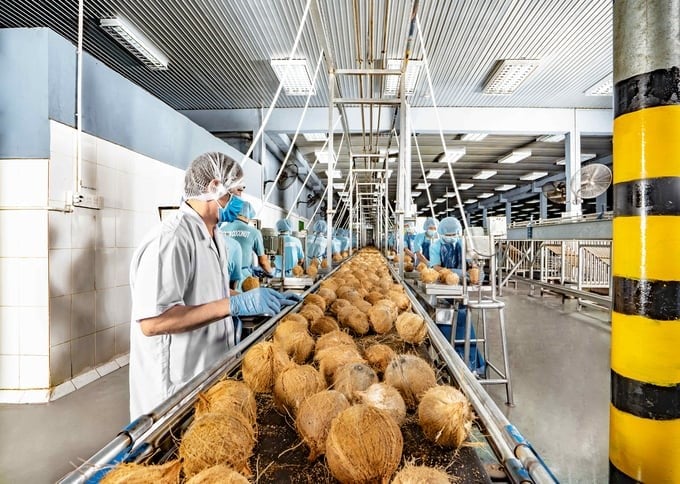
Every month, Luong Quoi Coconut Company purchases 3–5 million organic coconuts. Photo: Minh Dam.
When participating in organic coconut production linkage, farmers, cooperative groups, and cooperatives receive preferential and support policies from the business. The company also supports costs to evaluate certification of organic coconut raw material areas. Every month, the company has an internal control system (ICS) that regularly monitors and guides farmer households to practice farming.
The purchasing price is 15–20% higher than the outside market, depending on each price bracket. If the market price is VND 50,000/dozen (12 fruits) or less, the business will purchase at a price 20% higher. If the market price is above VND 50,000 to VND 100,000/dozen, businesses will purchase at a price 15% higher. At the same time, support purchasing and transportation costs for cooperative groups and cooperatives. In addition, for the cooperatives with the capacity of on-site pre-processing, the company will provide technical support as well as ensure the output of clean organic coconut meat.
"Almost all markets require export businesses to have organic certification for raw material areas and factories. Organic certification is like a passport for coconut products to reach the world market," Mr. Nguyen Bao Tri affirmed the organic production trend of the coconut industry.
Currently, Luong Quoi Coconut Company has produced, processed, and exported more than 10 products, such as desiccated coconut meat, canned coconut cream, coconut milk drink, coconut oil, coconut butter, etc. Some outstanding production standards that the company is pursuing include those in the US, Europe, Japan, South Korea, China, Taiwan, Canada, and Mexico.
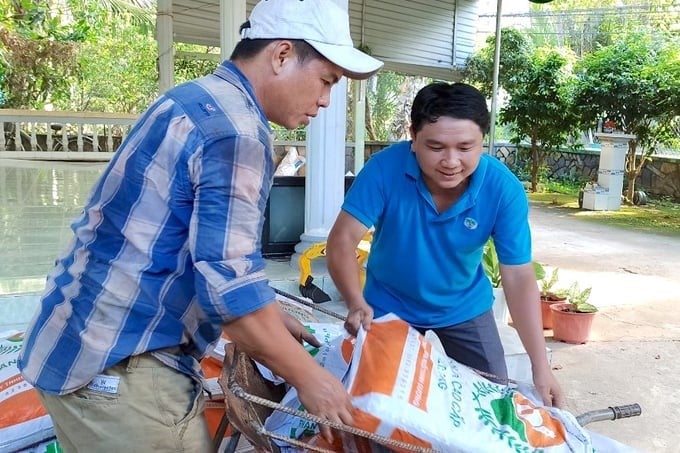
The business supports organic fertilizers for farmers. Photo: Minh Dam.
Mr. Tran Quoc Ung, Director of Thoi Thanh Agricultural Cooperative and Director of Thanh Phu District Cooperative Union, shared that the district has 7 cooperatives participating in linkage with Luong Quoi Coconut Company. The business strictly implemented committed policies, so people feel secure in production. The area is increasingly expanding, with over 208 ha in Thoi Thanh, over 20 ha in Tan Phong, about 20 ha in My Hung, over 100 ha in Dai Dien and Phu Khanh, 80 ha in Hoa Loi, and approximately 70 ha in Quoi Dien.
In Thoi Thanh commune, in the 2023-2024 period, the agriculture and rural development sector deploys a circular agriculture model for 8 households with an area of 5 ha and a model of "Model Organic Coconut Garden" on an area of 1 ha. The Provincial Agricultural Extension Center supports farmers in composting organic fertilizer from cow manure, coco peat, and Trichoderma fungus to fertilize coconut trees.
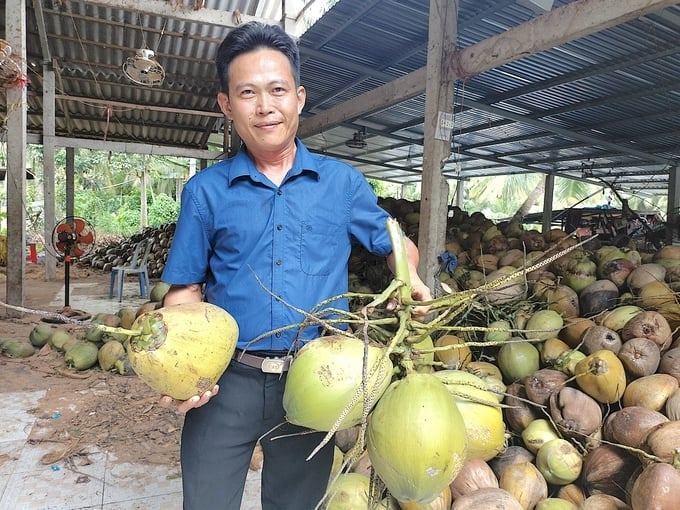
Mr. Chau Van Do, Director of Hoa Loi Agricultural Cooperative, said that the Cooperative plans to expand to 120 ha in 2024. Photo: Minh Dam.
When using self-composted organic fertilizer to fertilize coconut trees, Mr. Nguyen Van Doan, Thoi Thanh commune, who has 3.5 ha, saves VND 30–35 million/year compared to completely using chemical fertilizers. Every month, he sells 3,000 coconuts and earns VND 20–30 million. He also takes advantage of the ditch to raise all-male giant freshwater prawns in 3 stages to increase his income. Every year, he sells tons of shrimp and earns over VND 200 million.
Besides, organic coconut production also helps create stable jobs for local people. Mr. Chau Van Do, Director of Hoa Loi Agricultural Cooperative, added: The Cooperative currently creates jobs for 30 workers to peel coconuts, pick coconuts, thread coconut fibers, etc., with an income of VND 5–7 million/month. The Cooperative will consolidate its operations and expand its organic coconut area to 200 ha.
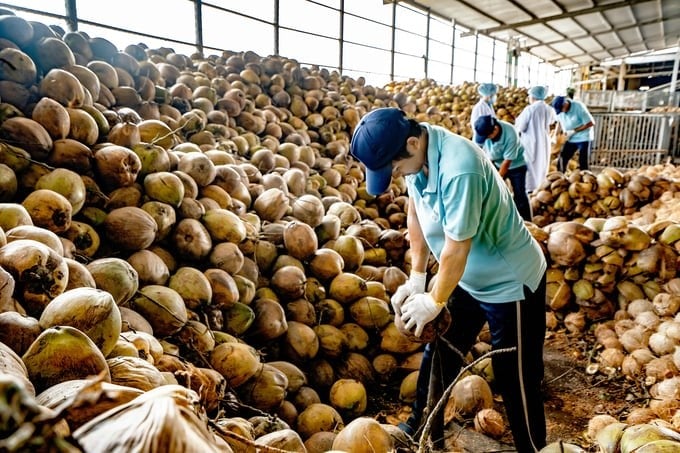
Coconut peeling workers have a stable income. Photo: Minh Dam.
With available advantages, organic coconut is becoming a promising direction for Ben Tre's coconut industry. In the future, organic coconut will not only contribute to the locality's socio-economic development but also affirm Ben Tre's position as a leading organic coconut granary in the country.
Besides the advantages, the organic coconut growing model also encounters difficulties and challenges, especially since the organic coconut consumption market is still limited, requiring investment in promotion and brand construction. In addition, the cost of organic certification is quite high, causing difficulties for many farmer households. And farmers need to be equipped with knowledge and techniques for growing organic coconuts.
Translated by Thu Huyen

(VAN) Japan's efforts to lower the price of rice through the release of its stockpile may finally be making some progress, albeit at a snail's pace.

(VAN) U.S. tariffs are not only a 'shock', but also an opportunity for Vietnamese businesses to renew their mindset toward comprehensive development.

(VAN) As Bac Giang lychee enters the harvest season, Minister Do Duc Duy expects that the fruit will contribute greatly to agricultural exports due to standardized production and deep processing.

(VAN) Consumers have shown a preference for free-range eggs, but those farming systems are more vulnerable to biosecurity risks like bird flu.
/2025/05/09/5701-1-184335_301.jpg)
(VAN) Vietnam’s eel exports nearly doubled thanks to a mud-free farming model, opening up new prospects while still facing numerous barriers related to international standards.

(VAN) Minister Do Duc Duy warned that if production is not professionalized and supply chains are not transparent, the U.S. market could become a growth bottleneck.
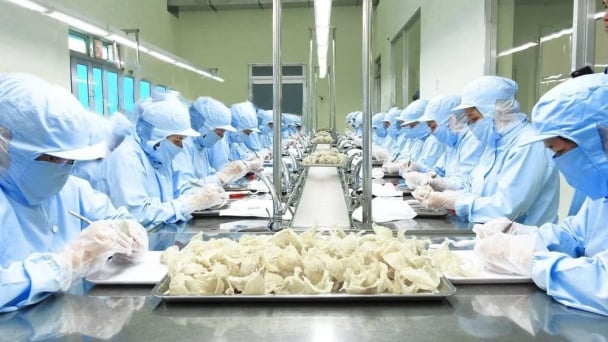
(VAN) Delegating surveillance responsibilities to local authorities is a cost-saving and efficiency-boosting measure that removes a key bottleneck for enterprises, according to Director General Duong Tat Thang.